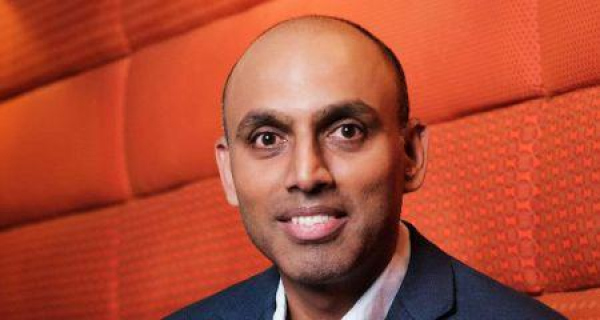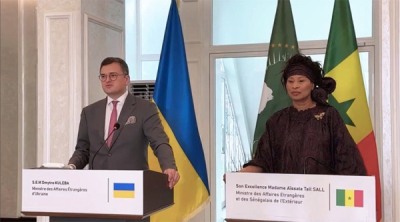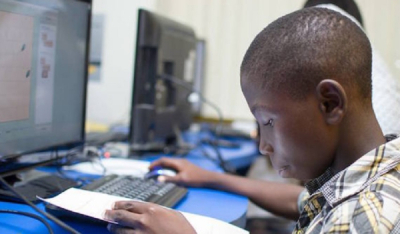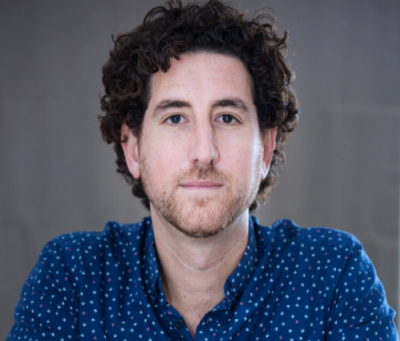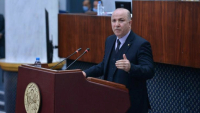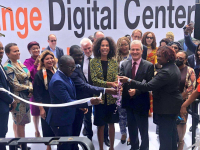In Nigeria, the security crisis ongoing since 2009 has increased the crime rate. To effectively deal with the problem, the government suggests the adoption of new technologies.
Nigerian Vice President Yemi Osinbajo (photo) has called on the Nigerian military to leverage digital tools to effectively combat terrorism and other forms of insecurity in the country. The official made that suggestion on Tuesday, Oct. 4, at the 32nd convocation ceremony of officer cadets of 69 Regular Course and postgraduate students of the Nigerian Defence Academy (NDA)
"[...] It is clear that we cannot secure or defend a country of this size with human assets alone; we must leverage technology. [...] At a time when national resources are stretched thin, we have to come up with technology-driven solutions to address our security needs. [...] We must become savvier in the deployment of Intelligence, surveillance and reconnaissance tools to complement our human resources,” he said.
Apart from the terror unleashed by Boko Haram in northeastern Nigeria since 2009, the country faces other threats such as organized crime and cybercrime. To address this, the federal government developed a national cybersecurity policy and strategy (NCPS 2021) and established a computer emergency response team (ngCERT) and a national digital forensics laboratory.
Like several other countries, Nigeria has adopted biometrics, which helps reduce identity theft, as well as facial recognition embedded in video surveillance systems in some major cities.
With Nigeria's digital transformation firmly underway, Yemi Osinbajo believes “there is no doubt that the digital domain is one of the frontiers” that the new generation of armed forces “will be increasingly tasked to defend.”
Samira Njoya
South Africa is the largest cloud market in Africa. The rainbow nation is home to the facilities of some of the biggest companies in the industry, including Microsoft, Amazon, Oracle, Huawei, Acronis, and now Google.
U.S. tech giant Google announced on Wednesday, Oct. 5, the launch of its first African cloud region in South Africa to provide cloud computing services to businesses. In South Africa, Google will compete with Amazon and Microsoft, which are already well-established in the cloud market.
The tech giant also plans to build cloud interconnection sites in Cape Town, Johannesburg, Lagos, and Nairobi and feed them with its Equiano subsea cable. According to Niral Patel (photo), director of Google Cloud Africa, the new region and interconnection sites will bring cloud services closer to customers, allowing them to choose where to “consume cloud services.”
The initiative is part of Google's plan to invest US$1 billion in the continent. It chose South Africa due to the high demand for cloud services and the market potential, we learn. According to Research and Markets’ "Africa Data Center Market - Industry Outlook & Forecast 2022-2027" report, in South Africa, cloud adoption is expected to grow by 25 percent annually and generate up to US$1.5 billion by 2024.
A Google Cloud-commissioned study by AlphaBeta Economics indicates that the South African cloud region will contribute more than US$2.1 billion to South Africa's GDP and support the creation of more than 40,000 jobs by 2030.
“The new region will allow for the localization of applications and services. It will make it really easier for our customers and partners to quickly deploy solutions for their businesses, whereby they’re able to leverage our computer artificial intelligence or machine learning capabilities, and data analytics to make smarter business decisions as they go forward,” Patel said.
Isaac K. Kassouwi
Digital technologies are key components in Senegal’s development program. Therefore, to achieve its 2025 development goals, the country has agreed to collaborate with Ukraine, which aims to become the “most digital country” in the world" after the Russian invasion.
On October 3, 2022, the Ukrainian Minister of Foreign Affairs, Dmytro Kuleba (photo, left) was in Senegal, the first step in his African tour. The Ukrainian official was welcomed by his Senegalese counterpart Aissata Tall Sall (photo, right).
"As part of its African strategy, Ukraine is deepening its relations with African countries. Making the first stop of my tour in Senegal is a symbolic move as the Senegalese president is currently the chairperson of the African Union. My peer Aissata and I have agreed to open a new chapter of mutually beneficial cooperation between Ukraine and Senegal," said Dmytro Kuleba.
The two ministers discussed steps to intensify cooperation in information technology, digitalization, cybersecurity, trade, agriculture, and education. "I came to Senegal with business leaders, notably those active in the digital sector where our country is really advanced. We can be of great help to Senegal in that sector and we are ready to offer more opportunities,” Dmytro added.
In recent years, before the Russian invasion, the Ukrainian digital economy and ICT industry recorded strong growth. In 2021, Ukraine's IT exports grew 36 percent year-on-year to US$6.8 billion, representing 10 percent of the country's exports.
Like Senegal, the country also has an extensive e-government platform where users can quickly get administrative documents. The goal of its platform, dubbed diaa, is to make all public services available online. Thanks to this platform, Ukraine has become the first country to recognize e-passports and ID cards as official documents.
Senegal, which also has the same objectives as the "Digital Senegal" platform, can therefore count on this new cooperation opportunity to achieve its "Digital Senegal 2025" ambitions.
Samira Njoya
In Africa, the edtech industry is growing fast, in the aftermath of the coronavirus pandemic that demonstrated the importance of digital transformation. Many startups are offering tailored solutions for students in that industry.
SmartED Africa is a digital solution developed by a Cameroonian eponymous startup. It provides access to courses, quizzes, and tests in various subjects. The start-up, based in Douala, was founded by Valerie Patricia Bararunyeretse, Simplice Tankoua, and Laba Kagalang.
The solution has an Android-only mobile app that allows users to register a SmartED Africa account, and choose their education level (class) to access the most helpful content. Although the app suggests the content most suited to every user’s education level, other content can be accessed via the side menu or even allow users to change their education level if they want to.
Users can watch or read the contents online or download them for offline access. The startup included the offline access feature to account for internet access issues that occur quite often in Africa.
SmartED Africa includes more than 500 lessons, 2,500 quizzes, and 200 tests per class in seven subjects. In the short term, the startup targets 10,000 app downloads. It also wants to increase its user base to 9,500 users and 6,500 subscribers. For now, its Playstore statistics show some thousand downloads.
Its pricing is as follows: XAF1,600 (US$2.41) monthly XAF3,100 quarterly or XAF4,600 annually. In 2022, it won the special women's prize during the Cameroonian chapter of the Orange Social Venture Prize. It thus won a check of XAF1 000 000 and 6-month coaching. It will also participate in the final phase of the competition involving 17 countries in which the Orange group operates.
Adoni Conrad Quenum
The tech and business enthusiast wants to make iiDENTIFii one of the global remote authentication leaders. Several awards have already welcomed his efforts.
Gur Geva (photo) is a South African tech entrepreneur and founder of iiDENTIFii. His startup, launched in 2017, specializes in digital identification, biometric verification, artificial intelligence, and machine learning.
For Gur Geva, iiDENTIFii is the most appropriate response to current security issues faced by individuals and companies. He wants to make the startup a global reference in remote authentication. For that purpose, he succeeded in getting iiDENTIFii integrated into the Microsoft Global Partner Network, a coveted professional network bringing together credible companies that provide identity verification services to multinational clients in the banking, insurance, retail, e-commerce, healthcare, gaming, and education sectors.
In September 2022, he raised US$15 million in growth capital to expand the identity protection business in Africa. “We’re excited to put the investment to work as we close in on our goal of authenticating every face in Africa. With this new funding and the networks of Arise, Sanari, and Bill – we are confident to continue our mission of stopping identity theft in Africa,” Gur Geva said after the raise led by Arise, one of Africa’s leading investment companies.
Before founding iiDENTIFIi, Gur Geva first launched InDox, “a professional document collection service for the largest 200 Credit Providers in South Africa.” He led InDOx, as the CEO, up till May 2019.
Thanks to iiDENTIFii, he won the Digital Innovation Award at the 2019 Sunday Times Top 100 Company Awards. He also won the Best of the Show Award at the Finovate Europe 2020 Conference, and the AI Leader of the Year 2020 Award during the AfricaTech Awards.
In 2021, iiDENTIFIi was named the Best Enterprise Solution in the MTN Business App of the Year Awards. That year, iiDENTIFIi was also recognized as the New and Emerging Independent Software Vendor Partner of the Year in the Microsoft South Africa Partner of the Year Awards.
Melchior Koba
In Morocco, 45.1% of food production ends up being wasted. Also, on average, every household wastes US$137 of their food budget on foods that end up in garbage bins monthly. Foodeals was created to tackle that issue.
Foodeals is a digital solution developed by an eponymous Moroccan startup founded in 2020. It fights food loss and waste by connecting users to restaurants, hotels, and bakeries. Apart from fighting food waste, it allows its users access to “meals at low prices.”
The solution has a mobile (Android and iOS) app that allows users to register an account either by providing personal information (like email, name, etc) or by connecting the app to a Gmail or Facebook account.
Once registered, users can access the various companies that offer meals at discounted prices on the platform. That way, instead of ending up in garbage bins, those meals become useful for households, orphanages, and associations that need them.
In late 2020, the startup disclosed its partnership with a notable association to sell more meals. The "association will be our single partner. All the transactions will be posted on our application. Supermarkets will post their offers of unsold products whose DLCs (Use by Date) are close (between D+3 and D+1), then the registered associations can order.”
In 2022, the start-up was the second winner of the national chapter of the Orange social venture prize. That selection qualifies it for the continental phase.
Adoni Conrad Quenum
In 2020 when the coronavirus pandemic was raging, slowing economic and administrative activities, Algerian President Abdelmadjid Tebboune announced public sector digitization as a state priority. The aim was to boost the country’s resilience in crisis times.
Algeria will launch a new digital platform for public services in the coming weeks. The platform was announced by Prime Minister Aïmene Benabderrahmane (photo), on Monday, October 3, while speaking before the parliament.
According to the government official, the digital platform will expand the range of digital public services offered by the government in sectors such as public procurement, sports, and tourism. Effective access to those dematerialized services will require a unique national identification number -whose project is being implemented in all the Tunisian ministries, he added.
The platform is in line with the social and economic reforms initiated by the government, in 2020, to ensure the effective digital transformation of the government.
By accelerating the dematerialization of public services, Algeria wants to improve the efficiency of its public administration, which is key to post-pandemic socio-economic recovery. With that efficiency, it wants to ensure transparency in public management and dynamize the business environment.
Muriel Edjo
The platform sells concrete artwork like decorative articles, tableware, furniture, and lighting.
Khalta is an e-commerce platform developed by an eponymous Tunisian startup and launched in 2017. It sells concrete artwork like decorative articles, furniture, tableware, furniture, and lighting.
The startup has no mobile app. Everything happens on the startup’s web and social media platforms or at its physical store. Users can browse the artworks available for sale without registering an account. However, to buy from the platform, they will have to register an account on the web platform. They can also request additional information on Whatsapp.
The platform integrates several payment options including bank cards and Paymee. Deliveries are free for purchases worth TND150 (US$46.25) or more. Buyers can also retrieve products bought online at the startup’s physical store.
In 2018, Khalta was selected as one of the best three Tunisian startups, during the second edition of the BloomMasters competition organized by the BIAT Foundation for Youth and the MIT Enterprise Forum Pan Arab.
Adoni Conrad Quenum
Over the past nine years, she built her event management experience with companies in various industries, including finance, telecommunications, and media.
Folayemi Agusto (photo) is the co-founder and CEO of tix.africa, a Nigerian ticketing startup founded in 2019. Through tix.africa, she offers digital services to help organizations, companies, and fair and festival organizers ensure the success of their virtual or live events.
The services offered include tools to promote events and collect payment as well as ticketing platforms. The service ecosystem simplifies logistics processes for tix. africa’s clients and boosts their profitability.
Tix is born out of personal experience. Indeed, in 2017, the startup’s cofounders (Folayemi Agusto and Nosa Oyegun) organized the third edition of the EatDrinkFestival -a food and drink festival- in Lagos, but “things didn’t go very well.”
“There were tens of thousands of people and we didn’t have a single piece of data about any one of them. Then, the poor network made making payments for food and drink an extreme sport,” the tix.africa co-founder explains.
That frustrating experience led them to enter the event management sector.
In September 2022, Folayemi announced the launch of a new service, Tix Box Office, to offer better event management support. The new service allows event managers and organizers to set up online storefronts to sell their tickets and products. “Before today, you could only list one event per page on Tix, and now on a creator’s Box Office, you can see events they have coming up,” she announced on Linkedin.
The tech entrepreneur entered the professional world, in 2013, the same year she obtained her BA in Sociology at the University of Virginia. That year, she joined Airtel Nigeria as an event and sponsorship assistant. Two years later, she was hired, as a research analyst, by SIM Capital Alliance.
She later became the guest relations and events coordinator of the job placement network Andela. In 2018, she was promoted to the position of travel experience manager.
Melchior Koba
The telecom operator’s goal is to help offer digital skills to the youth, boost their employability and prepare them for the evolving job market.
French telecom group Orange and the German cooperation Agency (GIZ) inaugurated, Monday (October 3), a new "Orange Digital Center" in Liberia. The technology center was officially inaugurated in a ceremony attended by Brelotte Ba, Deputy CEO of Orange Middle East and Africa. The center, based in Monrovia, aims to offer digital skills to everyone.
"I am very proud to inaugurate the 11th Orange Digital Center today in Liberia, which is part of a network of 32 Orange Digital Centers that will be deployed not only in Africa and the Middle East but also in Europe. The objective is to democratize access to digital technology to young people - with or without qualifications - giving them access to the latest technological skills to strengthen their employability and prepare them for the jobs of tomorrow," said Brelotte Ba.
The 715 square meter infrastructure “brings together four strategic programs of the Orange group, namely; a coding school, a solidarity FabLab - one of the Orange Foundation's digital manufacturing workshops, and an Orange Fab start-up accelerator, supported by Orange Ventures Africa, the investment fund.”
“All of the programs are provided free of charge and open to everyone. They range from digital training for young people, 90% of which are practical, guidance for project bearers, start-up acceleration, and investment in these,” an official release informs.
The digital center, which has been operational since January 2022, has already hosted several digital training courses and events. It also aims to establish Orange Digital Center Clubs, extensions of the coding school, in partner universities in the country. That way, as many people as possible can access the new technologies and use them to their full extent.
The center inaugurated yesterday is the eleventh inaugurated by Orange in the Middle East and Africa. The first ten were inaugurated in Tunisia, Senegal, Ethiopia, Mali, Côte d’Ivoire, Cameroon, Egypt, Jordan, Madagascar, and Morocco. It is in line with the group’s approach to digital inclusion and aims to “empower every person to take advantage of the opportunities of digitalization and work hard to close the digital divide.”
Samira Njoya
More...
Modernization of public services is a key requirement for the digital transformation advocated by the United Nations over the past thirty years. In Africa, which is still far behind the rest of the world, much remains to be done in that segment.
Sixteen countries are now e-government champions, the UN DESA indicates in its report "E-Government Survey 2022 The Future of Digital Government". In 2020, there were 14 champions.
In the new report, Côte d'Ivoire and Namibia have joined the list while Rwanda replaced Zimbabwe, which lost its place on that list.
South Africa, which was third in 2020, is now the first e-government champion in Africa. As for Mauritius, it lost one place to become second while Seychelles was bumped from second place to third.
According to the United Nations, Africa’s e-government champions are countries whose telecom infrastructure development, human capital, and online services rankings are above the continental average of 0.4054 points (out of 1.0000) and close to the global average of 0.6102 points.
Six of those champions are from Southern Africa, four from North Africa, three from West Africa, two from East Africa, and one from Central Africa.
In Africa, besides the champions, the ranking of thirty-three other countries was up to the continental average. Only six countries scored below average. They are namely the Central African Republic, Chad, South Sudan, Eritrea, Niger, and Somalia.
Despite the progress made by African countries in e-government, over the past two decades, some countries have overlooked the factor “inclusion,” the UN says.
“The groups easiest to reach have generally benefited most from the notable progress in e-government, while many of the poorest and most vulnerable populations have been left behind,” the report reads urging governments to strive for inclusion.
Muriel Edjo
Thanks to the ongoing tech revolution, African tech entrepreneurs are now able to address some of the issues facing local populations.
LukaPharma is a digital solution developed by a Congolese eponymous startup. It helps users check drug availability and find the nearest pharmacies.
Through its Android-only app, the solution allows users to register accounts and access all of its features, including the list of pharmacies on duty, drug availability, medication reminders, and online chats with pharmacists.
Users can upload the items on their medication order on the app and get notifications from pharmacies where the drugs are still available, within three minutes. Then, the user can check the contact details of the pharmacist where he/she can buy the drugs and choose either the nearest one or the ones with the best pricing.
LukaPharma also allows pharmacies to increase their visibility by getting listed, listing the best pricing for some drugs, or by suggesting alternative medical products for some diseases.
In 2022, the startup won the first prize in the national edition of the Orange Social Venture Prize. “It is an honor to receive this first prize and we thank Orange DRC, which is offering us this great opportunity to save more lives. We now want to double down to improve access to medication information. This prize [...] allows us to develop our business,” said LukePharma founder Charlotte Nsonga.
As of press time, the solution’s Playstore page was posting hundreds of downloads with an average of 4.6-star reviews. Thanks to the Orange Social Venture Prize, it could gain more visibility and be more helpful to the Congolese population.
Adoni Conrad Quenum
Through his fintech ClinicPesa, he is committed to improving the living conditions of local populations. His commitment has already earned him a selection to participate in two international accelerator programs.
Onyancha Chrispinus (photo) is a Ugandan computer engineer and tech entrepreneur. In 2016, he cofounded ClinicPesa, a fintech startup that offers micro-loans to enable access to quality healthcare.
The startup he heads, as the CEO, developed a digital platform that allows users to save money to be used for healthcare needs. The funds saved can be used to settle medical bills or purchase drugs and medical devices in partner hospitals and pharmacies when needed.
It also developed ClinicPesa Mama’s, a savings platform dedicated exclusively to maternal health. It allows expectant mothers or parents to save money, via mobile money, to prepare for their baby's arrival. The funds can be used to purchase a baby’s trousseau, pay for medical transportation or bills, etc.
Its co-founder holds a Master’s in software engineering from the Swiss Federal Institute of Technology Lausanne obtained in 2015. In 2019, he secured the D-Lab Scale-Ups Fellowship grant, which aims to support “local entrepreneurs bringing poverty-alleviating products and services to emerging markets at scale.” He integrated the labor market in 2011 when he was recruited, as a software engineer, by creativeDNA, a Ugandan tech company specializing in the development of mobile and digital solutions.
After a promotion to the position of a senior software engineer in 2012, he became the company's managing director four years later. Cumulatively, he was an instructor and author with UK IT company Packt, until March 2017.
This year, his startup is among the 60 startups that will participate in the second cohort of the Google for Startups Black Founders Fund for Africa. It is also one of 30 early-stage and growth-stage startups that will benefit from the Bill & Melinda Gates Foundation-funded pan-African Investing in Innovation (i3) program.
Melchior Koba
Senegal is gradually moving towards full-scale e-governance. To accelerate the process, it decided to partner with key partners in the local ICT sector.
National IT agency Senegal Numérique SA and the Senegalese Information Technology Association (SITSA ) signed, Thursday (September 29), a framework agreement to boost public-private partnership. The move aims to ensure seamless digital transition and further develop digital services in Senegal.
According to Cheikh Bakhoum (photo, right), General Manager of Senegal Numérique SA, this partnership is extremely important for the country, which needs support in its public service digitalization programs. “We are aware that our engineers will not be able to complete all those digital projects all by themselves. [Therefore, the agreement aims] to build a public-private partnership whereby local private actors will boost Senegal Numerique SA’s service offerings,” he said.
The partnership will primarily focus on the liberalization of state infrastructure, allowing private companies to exploit those infrastructures. For Antoine Ngom (photo, left), chairman of the SITSA, the partnership will also focus on boosting cooperation between Senegal Numerique SA and SITSA to successfully complete the major digital projects launched by the government. “This partnership was needed as it enables us to carry out the reforms needed for an enabling environment, and implement major digital projects in sectors like digital identity, health information systems …,” he explained.
In 2016, Senegal launched an ambitious digital transformation project for strategic sectors like education, health, etc. The projects are scheduled for completion by 2025. However, three years to completion, much remains to be done. For Mountaga Cissé, a digital specialist, one of the reasons the project is not evolving as planned is the instability of ministries in charge of its implementation. Within ten years, the name of the ministry in charge of the implementation of that project was changed several times and seven ministers were appointed, he indicates.
Samira Njoya



